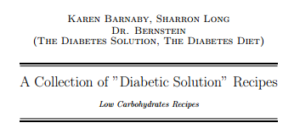Dr Katharine Morrison IDDT October 2007
DOWNLOAD PRESENTATION: How you can achieve normal blood sugars with
Dr Katharine Morrison IDDT October 2007
DOWNLOAD PRESENTATION: How you can achieve normal blood sugars with
Think Like a Pancreas: A Practical Guide to Managing Diabetes with Insulin–Completely Revised and Updated [Gary Scheiner] on Amazon.com. Few diabetes books focus specifically on the day-to-day issues facing people who use insulin.
The following pdf of Low Carb Recipes is a collection of recipes from Karen Barnaby and Sharron Long:

Page 1 of the table of contents:
DOWNLOAD HERE: Low Carb Recipes
From an evolutionary perspective, humanity’s adoption of agriculture, and hence cereal grain consumption, is a relatively recent phenomenon. Table 3 shows that this event occurred in most parts of the world between 5,500 and 10,000 years ago. Cereal grains represent a biologically novel food for mankind [341, 342], consequently there is considerable genetic discordance between this staple food, and the foods to which our species is genetically adapted.
DOWNLOAD ARTICLE HERE: Cereal article
ABSTRACT
Chromium (Cr) picolinate (CrPic) is a widely used nutritional supplement for optimal insulin function. A relationship among Cr status, diabetes, and associated pathologies has been established. Virtually all trials using CrPic supplementation for subjects with diabetes have demonstrated beneficial effects. Thirteen of 15 clinical studies (including 11 randomized, controlled studies) involving a total of 1,690 subjects (1,505 in CrPic group) reported significant improvement in at least one outcome of glycemic control. All 15 studies showed salutary effects in at least one parameter of diabetes management, including dyslipidemia. Positive outcomes from CrPic supplementation included reduced blood glucose, insulin, cholesterol, and triglyceride levels and reduced requirements for hypoglycemic medication. The greater bioavailability of CrPic compared with other forms of Cr (e.g., niacin-bound Cr or CrCl3) may explain its comparatively superior efficacy in glycemic and lipidemic control. The pooled data from studies using CrPic supplementation for type 2 diabetes mellitus subjects show substantial reductions in hyperglycemia and hyperinsulinemia, which equate to a reduced risk for disease complications. Collectively, the data support the safety and therapeutic value of CrPic for the management of cholesterolemia and hyperglycemia in subjects with diabetes.
DOWNLOAD STUDY HERE: chromium picolinate
Abstract
Many negative comments have been made about the use of ketogenic diets (KDs) and experts today
believe that the best way to lose weight is by cutting back on calories, chiefly in the form of fat. The
international consensus is that carbohydrates are the basis of the food pyramid for a healthy diet.
However, this review will clarify that low-carbohydrate diets are, from a practical and physiological point
of view, a much more effective way of losing weight. It is also argued that such diets provide metabolic
advantages, for example: they help to preserve muscle mass, reduce appetite, diminish metabolic
efficiency, induce metabolic activation of thermogenesis and favor increased fat loss and even a greater
reduction in calories. These diets are also healthier because they promote a non-atherogenic lipid profile,
lower blood pressure and decrease resistance to insulin with an improvement in blood levels of glucose
and insulin. Low-carbohydrate diets should therefore be used to prevent and treat type II diabetes and
cardiovascular problems. Such diets also have neurological and antineoplastic benefits and diet-induced
ketosis is not associated with metabolic acidosis, nor do such diets alter kidney, liver or heart functions.
DOWNLOAD: Arguments in Favor of Ketogenic Diets
Mainstream nutritional science has demonized dietary fat, yet 50 years and hundreds of millions of dollars of research have failed to prove that eating a low-fat diet will help you live longer. Indeed, the history of the national conviction that dietary fat is deadly, and its evolution from hypothesis to dogma, is one in which politicians, bureaucrats, the media, and the public have played as large a role as the scientists and the science. It’s a story of what can happen when the demands of public health policy–and the demands of the public for simple advice–run up against the confusing ambiguity of real science.
Ketones (start time 6:40) A growing body of scientific research demonstrates health benefits for many people with a diet that’s lower in carbohydrates, and higher in fats. In fact, some of this research indicates great therapeutic benefits,. One reason why may be that, when carbohydrate consumption is low enough, the body enters a state of “nutritional…